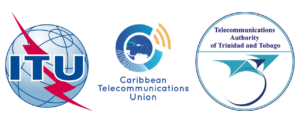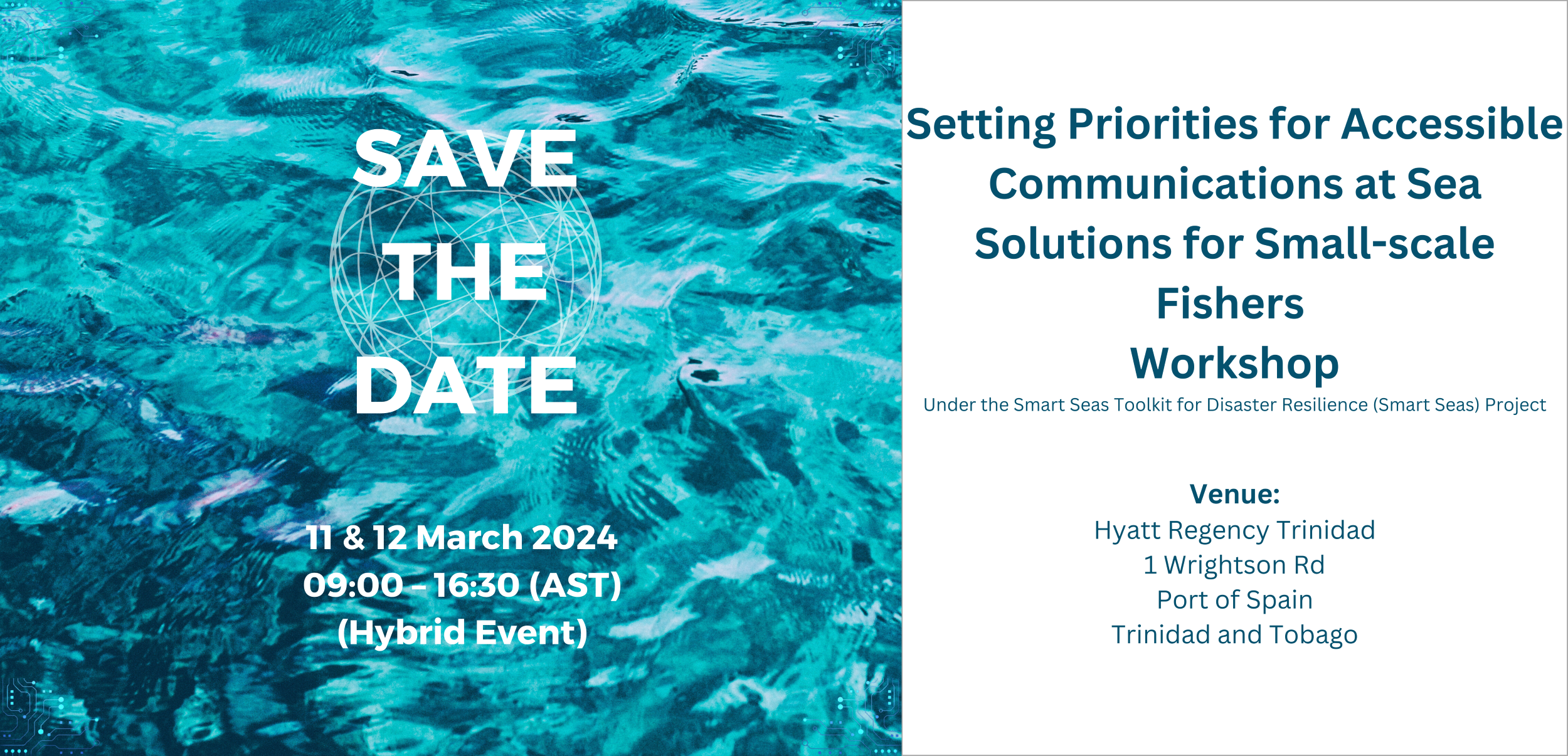Setting Priorities For Accessible Communications@Sea Solutions For Small-Scale Fishers Workshop
- Overview
- Agenda
- Registration
- Speakers
- Presentations
- Documents
- Media
- Sponsors / Partners
- Remote
Participation - Event
Evaluation
Overview of Agenda for Accessible Communications@Sea 4 SSF Activity
Fishing is one of the world’s most dangerous jobs. Small-scale fishers (SSF), who comprise over 90% of the world’s capture fisheries fleet and ply their trade in small, undecked crafts, are highly vulnerable to disasters while at sea which include, inter alia, piracy, adverse weather, and disasters resulting from climate change. Recognizing that information and communications technologies (ICTs) may be beneficial to all four phases of the disaster management cycle, and that gaps to accessible communications at sea solutions exist for SSF, the Smart Seas Project sets out to co-develop, with an international community, an Agenda for Accessible Communications at Sea Solutions for SSF, thereinafter referred to as the “Agenda Report”.
The Agenda Report outlines multi-sectoral, multi-stakeholder priorities to bridge gaps to accessible communications at sea for SSF, considering accessible communications to be a multi-dimensional problem which required multi-dimensional solutions. The report will be drafted over the period Dec 2023 – Mar 2024, concluding with an in-person Setting Priorities for Accessible Communications at Sea Solutions for SSF Workshop thereinafter referred to as “Priorities Workshop” in Trinidad and Tobago, to review, and finalize the Report, for onward publishing to the international community.
Background
The Smart Seas Project
The Smart Seas Toolkit for Disaster Resilience (“Smart Seas”) Project is a joint initiative of the International Telecommunication Union (ITU), Caribbean Telecommunications Union (CTU) and the Telecommunications Authority of Trinidad and Tobago (TATT), supported by the Government of the Republic of Trinidad and Tobago. It sets out to increase the resilience and ultimately preserve the lives of Caribbean small-scale fishers (SSF) through information and communications technologies (ICTs), with emphasis on the enabling environment. Its three-dimensional scope covers:
- Geographic area: Trinidad and Tobago’s Maritime Rescue Co-ordination Centre (MRCC), which covers Barbados, Grenada as well as St. Vincent and the Grenadines
- Problem space: maritime communications
- Beneficiary sector: fisheries, with emphasis on SSF
The Project’s activities include:
- Conducting a Gap Analysis of the Maritime Communications Enabling Environment, from which gap-filling recommendations are produced under consultation with key stakeholders
- Developing an online toolkit (Smart Seas Toolkit), to strengthen the maritime communications enabling environment
- Virtually training agencies within the Project’s beneficiary countries on the Toolkit
- Co-developing, with agents and agencies from an international community, an Agenda for Accessible Communications @ Sea Solutions for Small-scale Fishers (Agenda Report)
An Agenda for Accessible Comms@Sea for SSF
Recognizing that there may be a number of barriers to accessible communications at sea (comms@sea) solutions for SSF, the Agenda for Accessible Comms@Sea Solutions for SSF activity sets out to co-develop, with an international, multi-stakeholder community, a tiered list of priorities to enable accessible comms@sea for SSF, thereby reducing the risks associated with gaps in access to comms as well as necessary lifesaving as well as livelihood supporting data. These priorities will be captured over the period Dec 2023 – Mar 2024 through synchronous as well as asynchronous engagement with stakeholders, leading up to a hybrid, “Setting Priorities for Accessible Comms@Sea Solutions for SSF”, workshop on 11-12 Mar 2024 in Trinidad and Tobago. During this Workshop, the Agenda Report will be finalized and submitted to the Project Partners for their approval and publishing to the international community.
Aim and Objectives
The Agenda for Accessible Comms@Sea Solutions for SSF activity sets out to assemble a loose, global community to develop a tiered list of priorities across multiple stakeholder groups, to improve the accessibility of comms@sea for SSF. Its specific objectives are to:
- Consult with multi-sectoral stakeholders on the issues, interests & possible solutions to increase the accessibility of comms@sea for SSF
- Assess the state of accessible comms@sea and data for SSF
- Co-author & publish international priorities for accessible comms@ sea for SSF, following 2-day hybrid workshop (Trinidad; 11-12 Mar 2024)
Contributing Stakeholder Groups
| Research institutions | Policy makers |
| Standards bodies | Spectrum management agencies (SMAs) |
| Manufacturers | Maritime administrations (MARADs) |
| Service providers | MRCCs & coast stations |
| Fisheries authorities | Fisheries organizations (orgs) |
| Meteorological (MET) services | Disaster management agencies (DMAs) |
| Entrepreneurs | Other relevant agents & agencies |
Scope of Work
The Agenda Report recognizes that assessing accessible communications and its supporting data are multi-dimensional in nature, and proposes the following dimensions of focus:
| 1. Devices | 2. Services | 3. Capacity |
| 4. Adoption | 5. Policy & Regulatory Environment |
These dimensions draw on existing evaluations of accessible, affordable communications and connectivity from the ITU[1], Alliance for Affordable Internet (A4AI)[2], Broadband Commission on Sustainable Development[3], etc. As such, the gaps between what currently exists (the supply side) and what is required for accessible comms@sea (the demand side) are represented in the figure below.
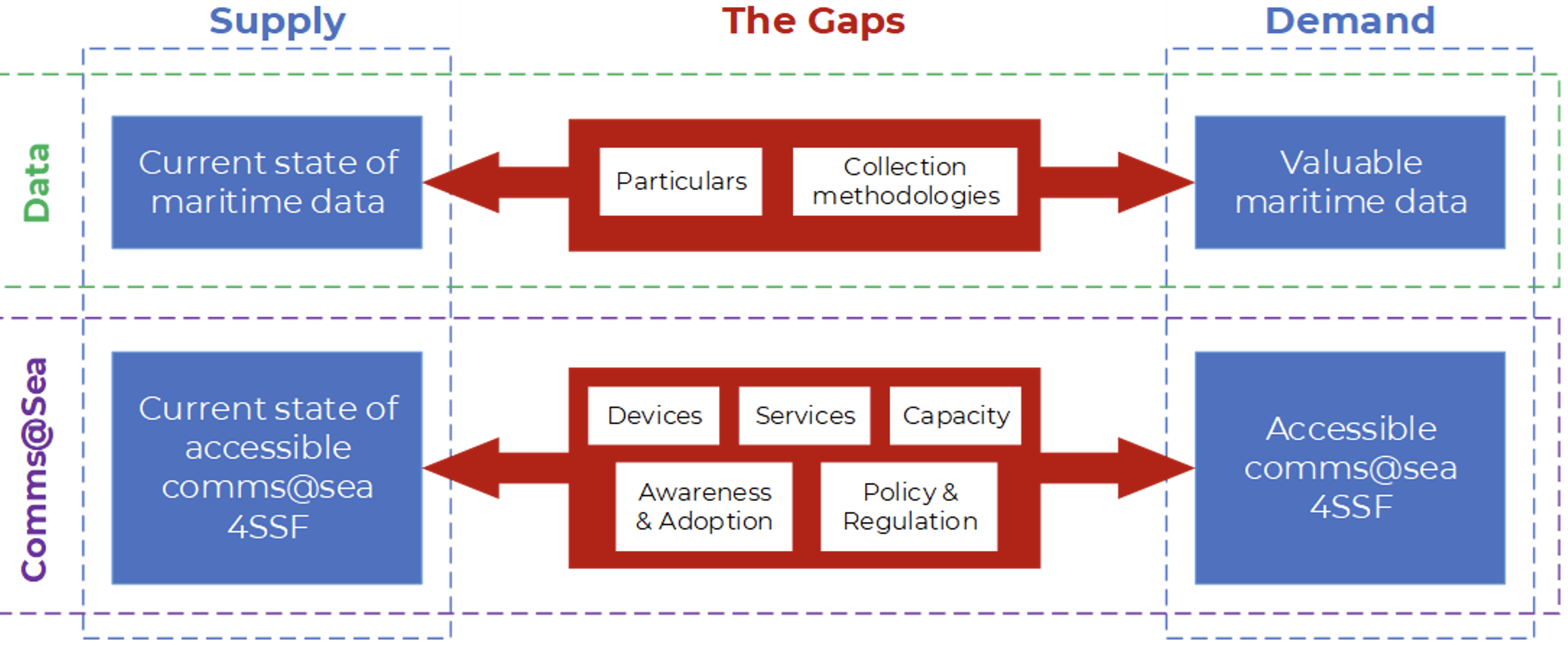
[1] ITU. 2020. Manual for measuring ICT access and use by households and individuals 2020 edition. Available at https://www.itu.int/en/ITU-D/Statistics/Documents/publications/manual/ITUManualHouseholds2020_E.pdf
A4AI. 2021. Affordability Drivers Index (ADI). Available at https://a4ai.org/research/affordability-drivers-index/
[3] Broadband Commission on Sustainable Development. Make Broadband Affordable. Available at: https://www.broadbandcommission.org/advocacy-targets/2-affordability/
Updated Workshop Plan (Download)
Workshop Plan (Download)
Programme at a Glance
| Time | Day 1 | Time | Day 2 |
| 9:00 | Opening & Welcome Remarks | 9:00 | Day 1 Recap & Day 2 Overview |
| 9:25 | Smart Seas & EW4ALL Overview | 9:10 | Working Session 5: Gaps |
| 9:50 | Feature Address: GoRTT | ||
| 10:00 | Photo & Break | 10:30 | Tea Break |
| 10:20 | ITU BR’s Small Fishing Vessel Communications: A Practical Guide for National Authorities & Fishers | 10:45 | Working Session 6: Key Priorities |
| 10:50 | Working Session 1: SSF, Safety at Sea & ICT Accessibility | ||
| 11:10 | Working Session 2: Accessible Comms@Sea | 12:00 | Lunch |
| 12:00 | Lunch | 13:00 | Working Session 7: Progress Tracking & Next Steps |
| 13:00 | Working Session 3: Demand | 14:15 | Working Session 8: Ad Hoc |
| 15:00 | Tea Break | 15:15 | Tea Break |
| 15:15 | Working Session 4: Supply | 15:30 | Recap & Consensus |
| 16:00 | Plenary: Working Session Recaps | ||
| 16:25 | Day 1 Closure | 16:00 | Closing Ceremony |
| 16:30 | End of Day 1 | 16:30 | End of Day 2 |
Workshop Programme
Day 1
| Time (AST) | Session | Room |
| Day 1 | ||
| 8:00 AM | Registration & Badging | Ranissa Mathura:
|
Port of Spain Ballroom |
| 8:55 AM | 5 Mins Notice | Mr. Tariq Mohammed | Port of Spain Ballroom |
| 9:00 AM | Day 1 Opening | Mr. Tariq Mohammed
|
Port of Spain Ballroom |
| 9:10 AM | Welcome Remarks:
|
Port of Spain Ballroom |
| 9:25 AM | Presentations:
|
Port of Spain Ballroom |
| 9:50 AM | Feature Address: GoRTT | Senator the Honourable Hassel Bacchus | Port of Spain Ballroom |
| 10:00 AM | Group Photo & Tea Break | Hyatt Staircase / Port of Spain Ballroom |
| 10:20 AM | ITU BR’s Small Fishing Vessel Communications: A Practical Guide for Nationanl Authorities & Fishers | Mr. Emmet Ryan | Port of Spain Ballroom |
| 10:50 AM | Working Session 1: SSF, Safety at Sea & ICT Accessibility | |
| BO 1: Telecommunications Agencies | Mr. Tariq Mohammed | Port of Spain Ballroom | |
| BO 2: Fisheries Agencies, , MRCCs & Coast Stations | Ms Renasha Cassar | Point Lisas Room | |
| BO 3: All Other Agencies | Dr. Kim Mallalieu | Point Fortin Room | |
| BO 4: Online | Mr. Tyler Seudath | Zoom | |
| BO 5: Online | Mr Daniel Goitia | Zoom | |
| 11:15 AM | Working Session 2: Accessible Comms@Sea for SSF | |
| BO 1: Telecommunications Agencies | Mr. Tariq Mohammed | Port of Spain Ballroom | |
| BO 2: Fisheries Agencies, , MRCCs & Coast Stations | Ms Renasha Cassar | Point Lisas Room | |
| BO 3: All Other Agencies | Dr. Kim Mallalieu | Point Fortin Room | |
| BO 4: Online | Mr. Tyler Seudath | Zoom | |
| BO 5: Online | Mr Daniel Goitia | Zoom | |
| 12:00 PM | Lunch | Port of Spain Ballroom |
| 1:00 PM | Working Session 3: Demand | |
| BO 1: Telecommunications Agencies | Mr. Tariq Mohammed | Port of Spain Ballroom | |
| BO 2: Fisheries Agencies, , MRCCs & Coast Stations | Ms Renasha Cassar | Point Lisas Room | |
| BO 3: All Other Agencies | Dr. Kim Mallalieu | Point Fortin Room | |
| BO 4: Online | Mr. Tyler Seudath | Zoom | |
| BO 5: Online | Mr Daniel Goitia | Zoom | |
| 3:00 PM | Tea Break | Port of Spain Ballroom |
| 3:15 PM | Working Session 4: Supply | |
| BO 1: Telecommunications Agencies | Mr. Tariq Mohammed | Port of Spain Ballroom | |
| BO 2: Fisheries Agencies, , MRCCs & Coast Stations | Ms Renasha Cassar | Point Lisas Room | |
| BO 3: All Other Agencies | Dr. Kim Mallalieu | Point Fortin Room | |
| BO 4: Online | Mr. Tyler Seudath | Zoom | |
| BO 5: Online | Mr Daniel Goitia | Zoom | |
| 4:00 PM | Recap & Consensus | Tariq Mohammed:
|
Port of Spain Ballroom |
| 4:25 PM | Day 1 Closing | Mr. Tariq Mohammed | Port of Spain Ballroom |
Day 2
| Time (AST) | Session | Room |
| Day 2 | ||
| 8:00 AM | Room opens for all attendees | Port of Spain Ballroom |
| 8:55 AM | 5 Mins Notice | Mr. Tariq Mohammed | Port of Spain Ballroom |
| 9:00 AM | Day 1 Opening | Mr. Tariq Mohammed
|
Port of Spain Ballroom |
| 9:10 AM | Break Out: Working Session 5: Gaps | |
| BO 1: Telecommunications Agencies | Mr. Tariq Mohammed | Port of Spain Ballroom | |
| BO 2: Fisheries Agencies, , MRCCs & Coast Stations | Ms Renasha Cassar | Point Lisas Room | |
| BO 3: All Other Agencies | Dr. Kim Mallalieu | Point Fortin Room | |
| BO 4: Online | Mr. Tyler Seudath | Zoom | |
| BO 5: Online | Mr Daniel Goitia | Zoom | |
| 10:30 AM | Tea Break | Foyer |
| 10:45 AM | Break Out: Working Session 6: Key Priorities | |
| BO 1: Telecommunications Agencies | Mr. Tariq Mohammed | Port of Spain Ballroom | |
| BO 2: Fisheries Agencies, , MRCCs & Coast Stations | Ms Renasha Cassar | Point Lisas Room | |
| BO 3: All Other Agencies | Dr. Kim Mallalieu | Point Fortin Room | |
| BO 4: Online | Mr. Tyler Seudath | Zoom | |
| BO 5: Online | Mr Daniel Goitia | Zoom | |
| 12:00 PM | Lunch | Foyer |
| 1:00 PM | Break Out: Working Session 7: Progress Tracking & Next Steps | |
| BO 1: Telecommunications Agencies | Mr. Tariq Mohammed | Port of Spain Ballroom | |
| BO 2: Fisheries Agencies, , MRCCs & Coast Stations | Ms Renasha Cassar | Point Lisas Room | |
| BO 3: All Other Agencies | Dr. Kim Mallalieu | Point Fortin Room | |
| BO 4: Online | Mr. Tyler Seudath | Zoom | |
| BO 5: Online | Mr Daniel Goitia | Zoom | |
| 2:15 PM | Break Out: Working Session 8: Ad Hoc | |
| BO 1: Telecommunications Agencies | Mr. Tariq Mohammed | Port of Spain Ballroom | |
| BO 2: Fisheries Agencies, , MRCCs & Coast Stations | Ms Renasha Cassar | Point Lisas Room | |
| BO 3: All Other Agencies | Dr. Kim Mallalieu | Point Fortin Room | |
| BO 4: Online | Mr. Tyler Seudath | Zoom | |
| BO 5: Online | Mr Daniel Goitia | Zoom | |
| 3:15 AM | Tea Break | Foyer |
| 3:30 PM | Recap & Consensus | Tariq Mohammed:
|
Port of Spain Ballroom |
| 4:00PM | Closing Ceremony:
|
Port of Spain Ballroom |
| 4:30 PM | End of Workshop |
Day 1 | |
|---|---|
| Workshop Day 1 | |
Day 2 | |
| Workshop Day 2 | |
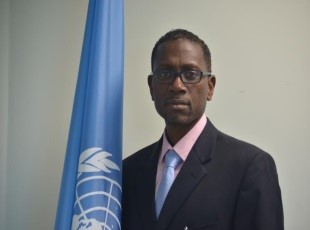 Cleveland Thomas, ITU Caribbean Representative ITU Caribbean Office Effective August 14th, 2011 Mr. Cleveland Thomas was appointed the ITU Representative for the Caribbean. Prior to this appointment Mr. Thomas was the CEO for the State Enterprise, National Information and Communication Technology Company Limited (Trinidad and Tobago). He also held the post of National Chief Information Officer (NCIO) for the Government of the Republic of Trinidad and Tobago. As NCIO and CEO, Cleveland was charged with the responsibility to implement the Government’s Vision for development: improvement in health care, education, computers for students, commerce, transport, security etc, through technology. Mr. Thomas brings a wealth of ITU experience. He was Trinidad and Tobago’s representative at the International Telecommunication Union (ITU) for over 14 years and sat as the Caribbean region’s representative at the ITU Council. He chaired a number of Study Groups, Rapporteur Groups and was TAL’s chairman. He also made presentations to government officials in Russia, the Caribbean, Fiji, Botswana and Zimbabwe. |
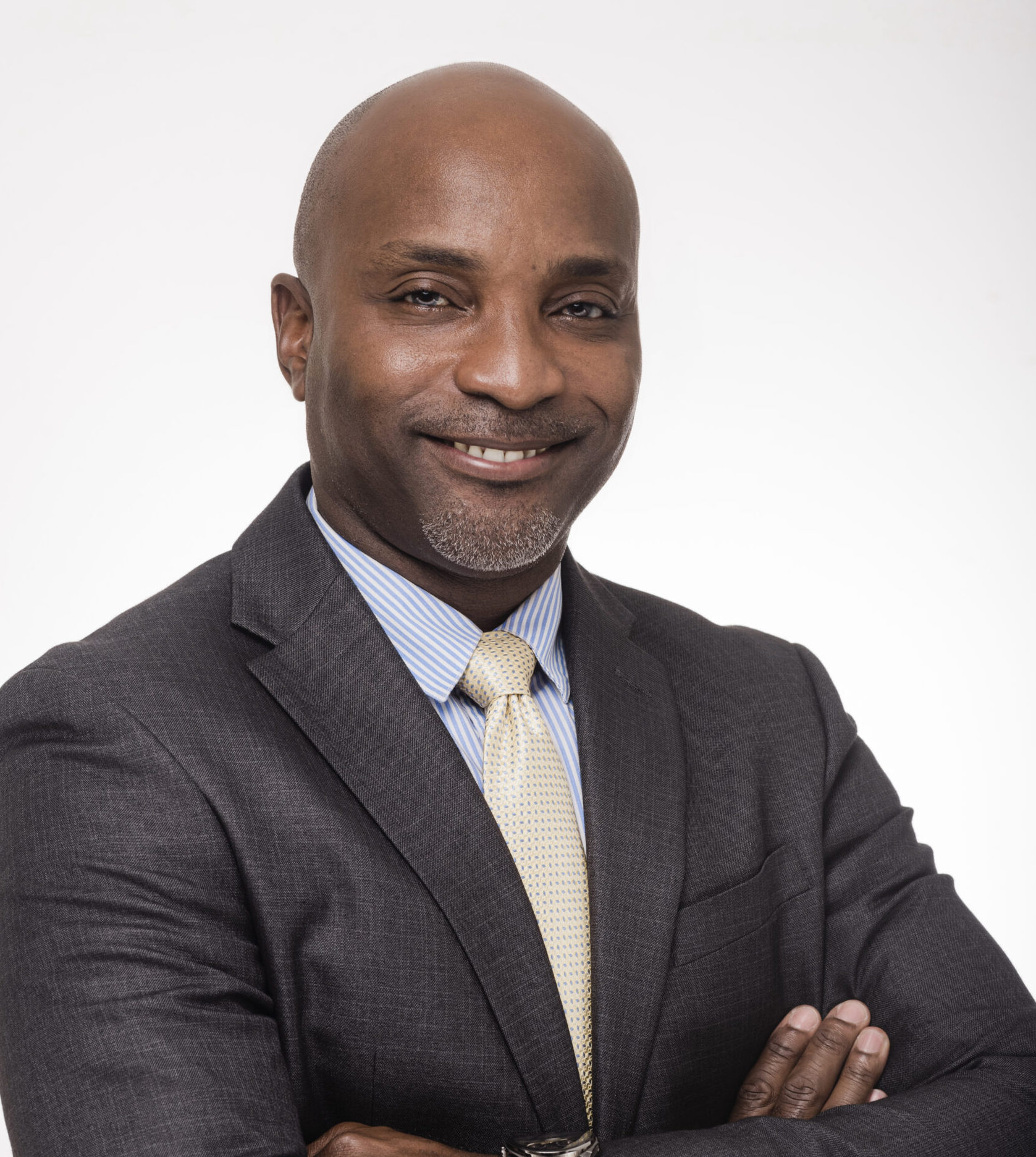 Rodney Taylor, Secretary-General, CTU Mr. Rodney Taylor was appointed Secretary-General of the Caribbean Telecommunications Union (CTU) on March 1, 2021. Prior to this, he held senior positions in the Government of Barbados, serving as the Chief Digital Technology Officer at Barbados’ Ministry of Industry, Innovation, Science and Technology (MIST) where he led the nation’s digital transformation, focusing on enhancing public sector service delivery through strategic innovation, science, and SMART technology applications. Additionally, Mr. Taylor served as the Head of the Information Systems Unit at Barbados’ Ministry of Foreign Affairs and Foreign Trade, where he oversaw operations at both local and overseas missions. With over 25 years of professional experience in the Public Sector, Mr. Taylor currently supports collaboration amongst Caribbean Governments and other ICT Stakeholders in shaping regional ICT policies and in implementation of national strategies. Recognised as an authority on Technology and Internet Governance, Mr. Taylor holds a Masters in Management and Information Systems and a Post-graduate Diploma in Public Sector Management. |
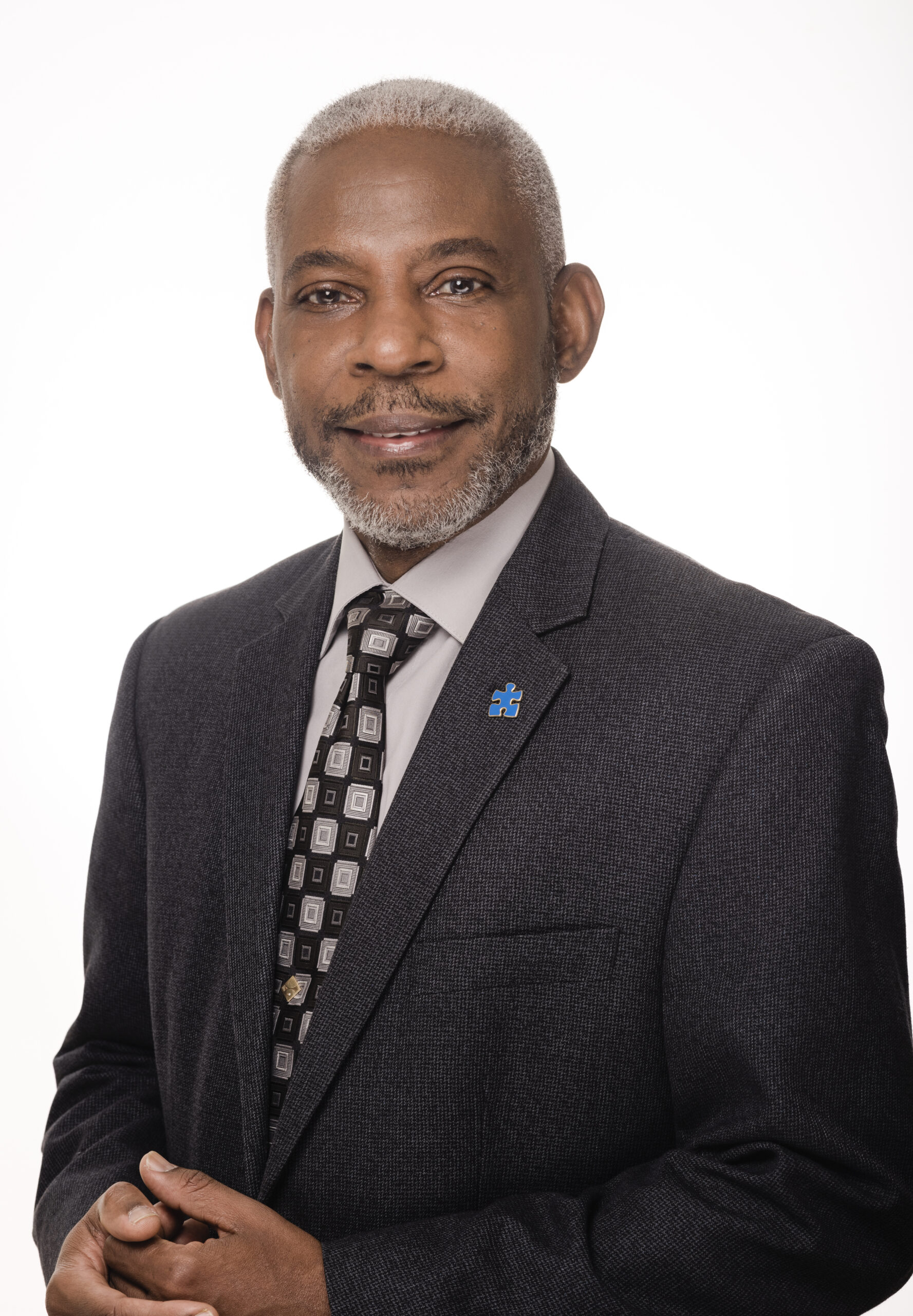 Nigel Cassimire, Deputy Secretary-General, CTU Nigel Cassimire is a telecommunications engineer with over thirty years of experience in the technical, operational and executive management of telecommunications systems and services. He has intimate understanding of a broad range of information and communications technologies and services, with practical experience in network and service planning, operations management and domestic and international telecommunications policy development. Mr. Cassimire has functioned as a Consulting Telecommunications Specialist since July 2005 and has worked extensively with the Caribbean Telecommunications Union (CTU) Secretariat in Port of Spain developing and promoting harmonised Caribbean positions in the areas of spectrum management, Internet governance and ICT policy. He has also successfully conducted consultancies for several of the member governments of the CTU. Mr. Cassimire has Bachelor’s and Master’s degrees in Electrical Engineering as well as a Diploma in Management Studies from The University of the West Indies, St. Augustine. He is a fellow of the Telecommunications Engineering and Management Institute of Canada (TEMIC) and an alumnus of the Advanced Management Programme at INSEAD, Fountainbleau, France |
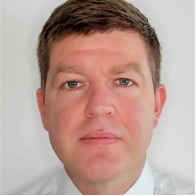 Emmet Ryan, ITU Radiocommunication Bureau Emmet is part of the maritime group within the Terrestrial Publication and Registration Division of ITU Radiocommunication Bureau. Prior to joining ITU in 2021, Emmet spent over twelve years working for the Irish Maritime Administration as a Ship Radio Surveyor. His work included the inspection of ships and fishing vessels, developing and implementing national/international maritime radio safety regulations, managing the national ship radio licencing registration processes, and assisting with maritime accident investigations. Before joining the Irish Maritime Administration, Emmet spent six years as an Electro-Technical Officer working worldwide onboard ships. |
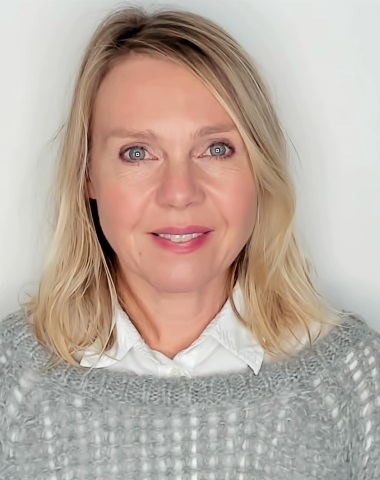 Vanessa Gray, Head, Environment and Emergency Telecommunications Division, ITU BDT Vanessa Gray is the Head of the ITU Telecommunication Development Bureau’s (BDT) Division of Environment and Emergency Telecommunications. She is responsible for developing and overseeing projects and technical assistance on disaster preparedness, mitigation, response, and recovery. This includes the development of national emergency telecommunication plans (NETPs) and the organization of regional and national workshops and capacity building exercises for disaster management. In the area of disaster response, Ms Gray leads the work on the Disaster Connectivity Maps (DCM) and the deployment of emergency telecommunication equipment to countries hit by disasters. Ms Gray is the ITU focal point for the UN’s Early Warning for All (EW4all) initiative and coordinates the initiative’s pillar on Warning Dissemination and Communication, to ensure that alerts reach people at risk. She is also responsible for the organization of the Global Forum on Emergency Telecommunication (GET) and specific ICT for disaster management tools and publications, for example in the area of disruptive technologies, gender, and ICT drills. In the area of the environment, Ms Gray coordinates the BDT’s work on the circular economy and green digital transformation, which includes monitoring industry emissions, energy use and climate commitments from tech companies, and supporting countries in tracking ICT sector GHG emissions. In the area of circular economy, Ms Gray manages the work on e-waste policies and data, which includes the publication of the Global and Regional E-waste Monitors. Her role is to build public-private partnerships, develop projects and strengthen the role of the BDT in terms of e-waste coordination, for example with the E-waste Coalition, the Global E-waste Statistics Partnership, and with the private sector. Prior to this position, Ms Gray was part of the ITU’s Data and Statistics Division and contributed to the design and preparation of the Division’s analytical publications, including the Measuring the Information Society Report (MISR). She also contributed to and coordinated the analysis of information society developments, organized ICT-related meetings, and delivered national and regional trainings and workshops on ICT statistics to ITU member states. Ms Gray holds a Master’s degree in Political Science and Economics from the Graduate Institute of International and Development Studies in Geneva, Switzerland. |
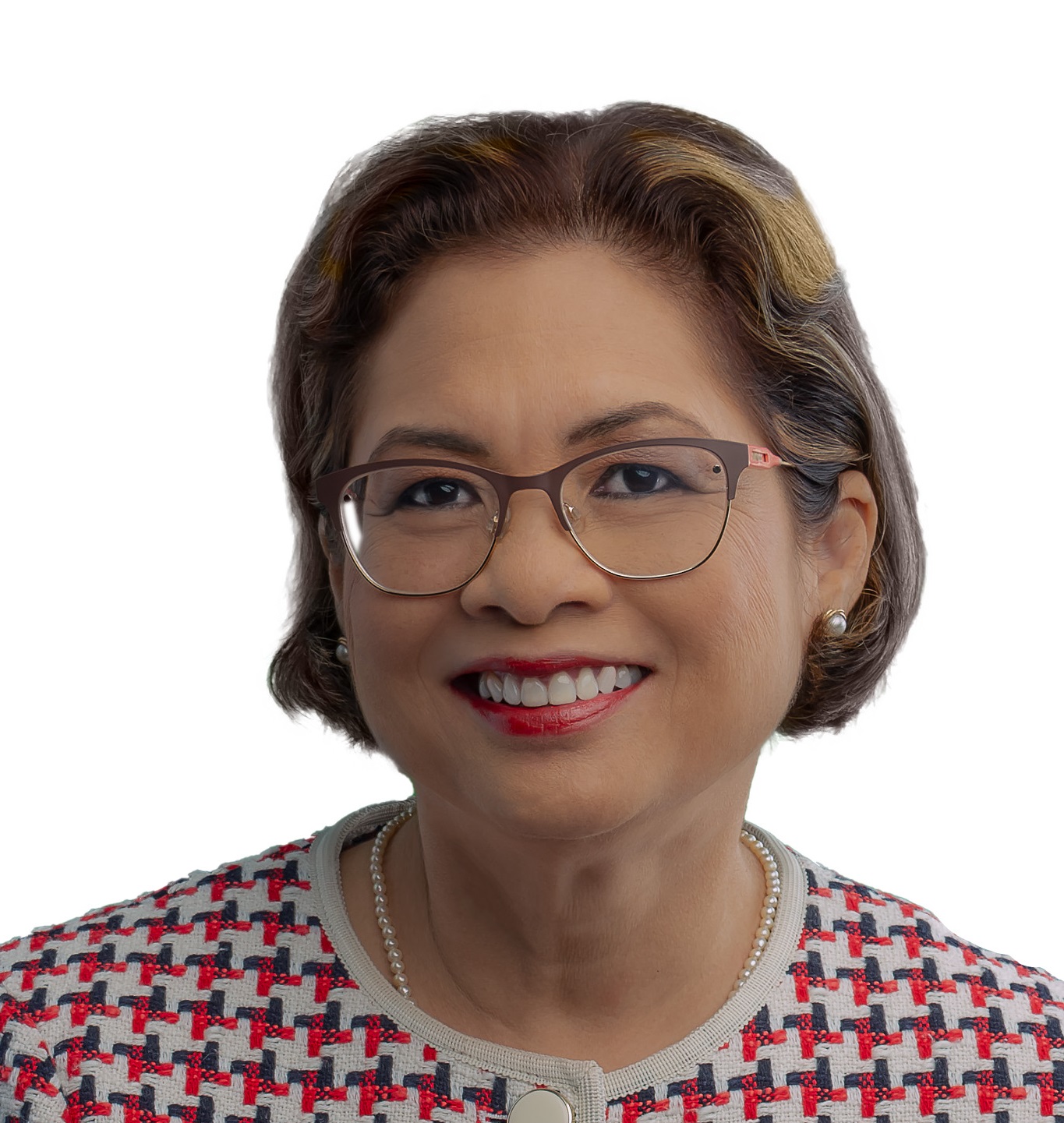 Dr. Kim Mallalieu, Technical Supervisor, Special Advisor and Expert, Smart Seas Project Kim Mallalieu is pro bono technical supervisor, special advisor and expert for the Smart Seas Project. She works in multidisciplinary capacities to enable the benefit of information and communications technology (ICT) for all. She does so through several roles including senior lecturer and leader of the Communication Systems Group in Electrical and Computer Engineering at The University of the West Indies (UWI), chair of the Campus ICT Steering Committee, principal investigator of the Caribbean ICT Research Program, deputy chair of the Board of the Telecommunications Authority of Trinidad and Tobago (TATT), vice chair of the Advisory Board for the Network of Women in the Development Sector of the International Telecommunication Union (ITU), chair of the Network of Women in Permanent Consultative Committee I (PCC.I) of the Inter‑American Telecommunication Commission (CITEL), coordinator of the PCC.I Mentoring program, and chief rapporteur of UN’s Universal Safeguards for DPI (SafeDPI) Initiative. Dr. Mallalieu has led national, regional and international initiatives variously designed to build capacity in ICT policy, regulation, development, application and use. Among these is the Master’s degree in Telecommunications Regulation and Policy, MRP (Telecommunications). She also co-delivers courses in Carnegie Mellon University’s Centre for Executive Education in Technology Policy. Her rich service portfolio includes past and present membership on boards, commissions, cabinet appointed committees and technical working groups at institutional, national and regional levels in operational as well as advisory roles. Recent memberships include the Digital Society Technical Working Group of the Government of Trinidad and Tobago. Among other credentials, Dr. Mallalieu holds a BS in Electrical Engineering from MIT and a PhD in Electronic and Electrical Engineering from University College London. She is a licensed amateur radio and GMDSS short range operator, and a member of Radio Emergency Associated Communication Teams (REACT). She is also a Fulbright Fellow and the recipient of local, regional and international teaching and research awards, and other awards of distinction. |
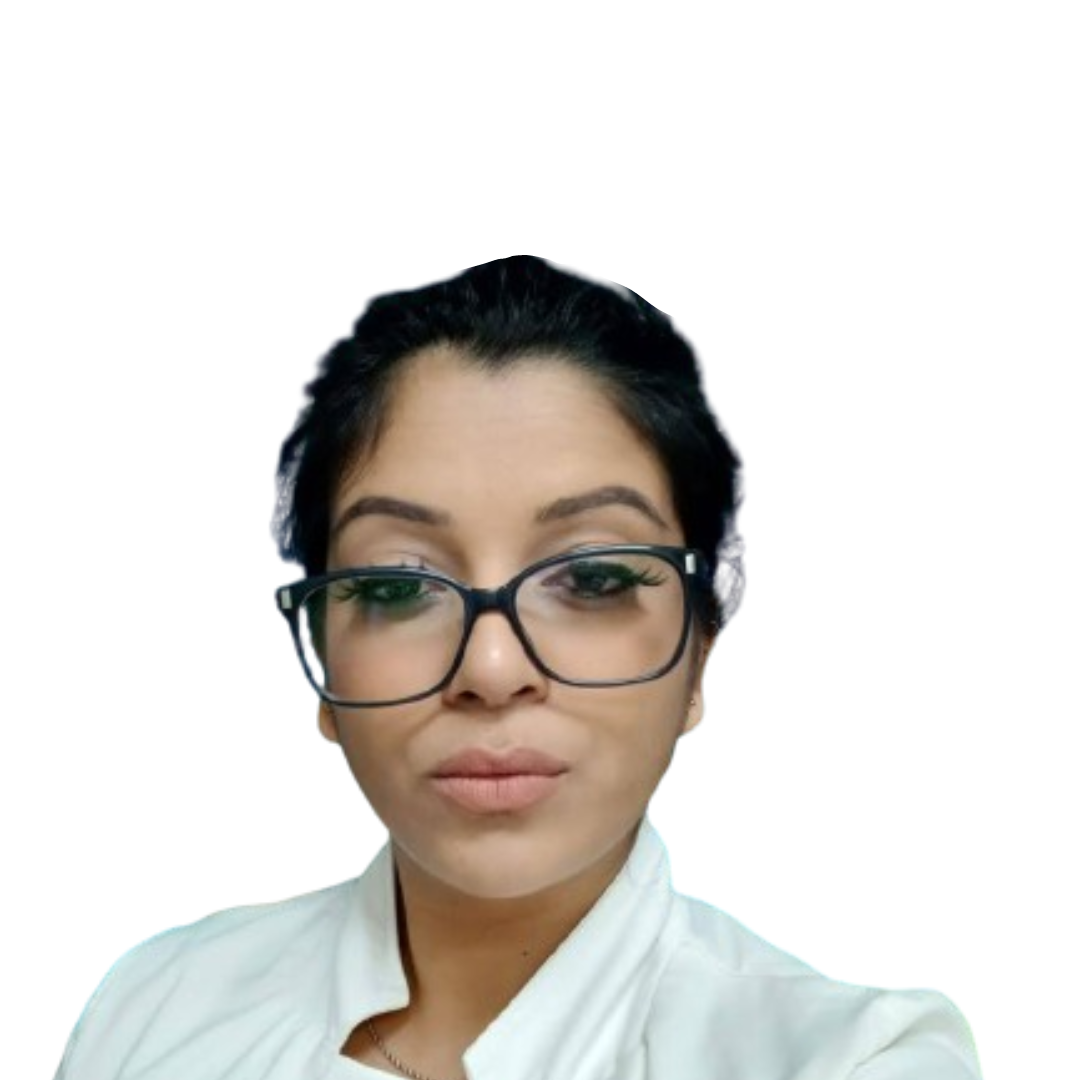 Ranissa Mathura, Administrative Consultant, ITU | Smart Seas Project Team Member Ranissa Mathura is an Administrative Consultant to the ITU with a strong background in coordination, planning, logistics and project management. She has experience working alongside UN funded projects through International agencies such as the United Nations Democracy Fund (UNDEF) and the ITU, alongside local projects, funded through private sector and state agencies. She has a passion for effecting positive change in the Caribbean through the initiatives of meaningful projects and hopes to help improve the lives of many through diligence to duty. |
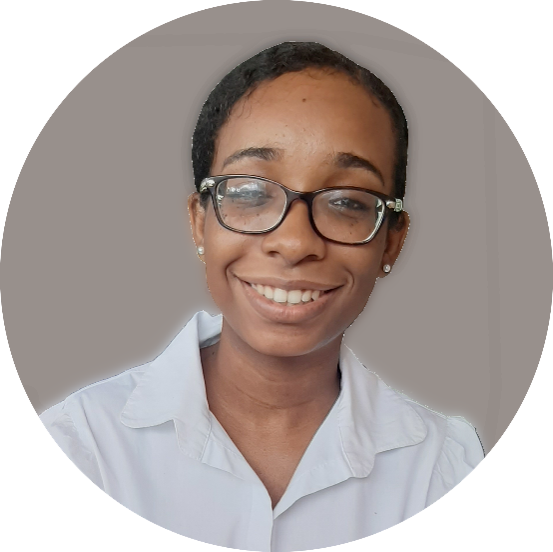 Renasha Cassar, Radio Engineer Consultant, ITU | Smart Seas Project Team Member Renasha Cassar holds a BSc. in Electrical and Computer Engineering from the University of the West Indies (UWI) and currently works as a radio engineer consultant under the Smart Seas project. Her areas of interest include the use of ICTs for development, bridging the digital divide, programming, networking and IoT. |
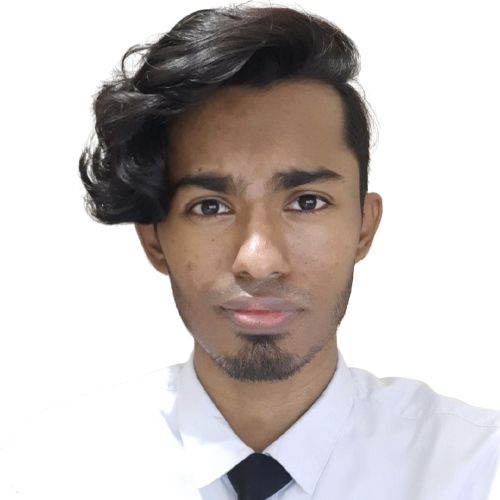 Tariq Mohammed Radio Engineer Consultant, ITU | Smart Seas Project Team Member Tariq is a radio engineer consultant for the International Telecommunication Union (ITU), a Generation Connect Youth Envoy for the ITU’s Americas region, as well as an MPhil student in the Department of Electrical and Computer Engineering at the University of the West Indies. Born and raised in Trinidad and Tobago, Tariq has an avid interest in tackling issues such as digital exclusion and ICT inaccessibility through multi-dimensional approaches which span both technical and social domains and is keenly interested in applying his knowledge and skills to further national and regional development within the ICT sector. His interests also include the development of telecommunications policies and regulations to create a more inclusive digital future. |
 Tyler Seudath, Radio Engineer Consultant, ITU | Smart Seas Project Team Member Tyler is a radio engineer consultant for the International Telecommunication Union (ITU) and is currently an MASc student in Electrical and Computer Engineering with specialization in Communications systems at the University of the West Indies (UWI). He has a passion for Telecommunications and hopes to make a meaningful impact in this sector. |
| Media Coverage |
Partners
